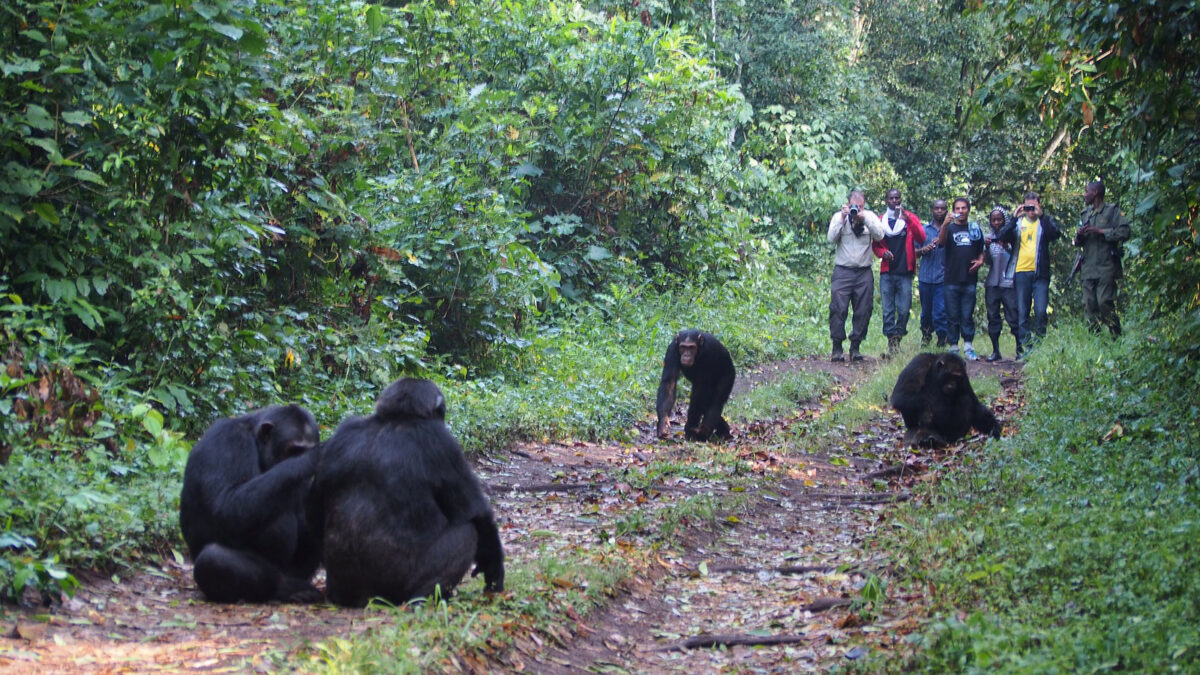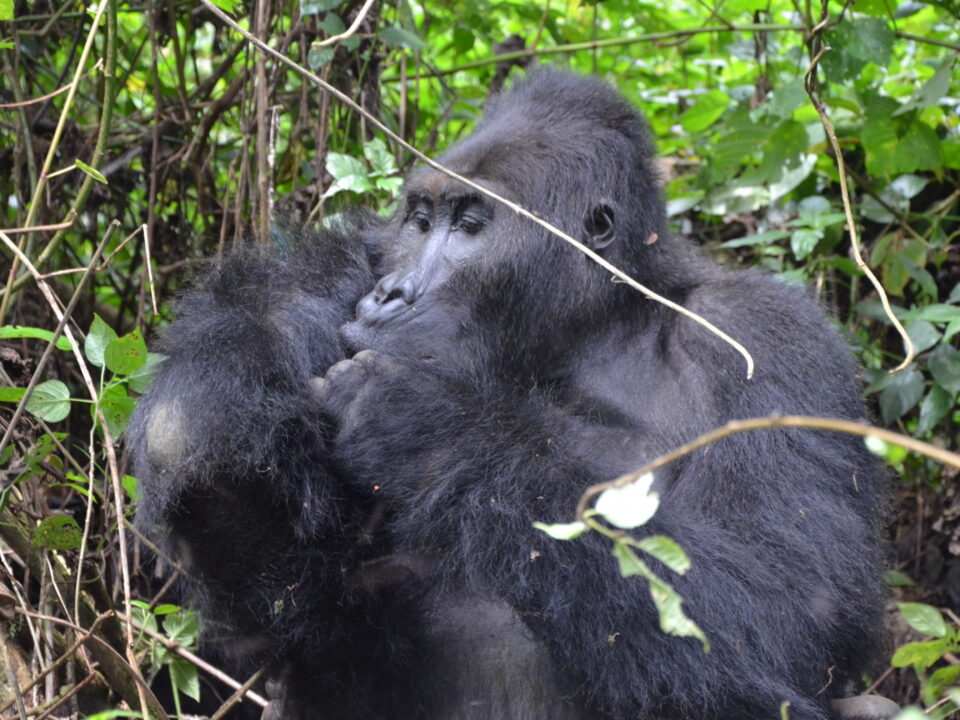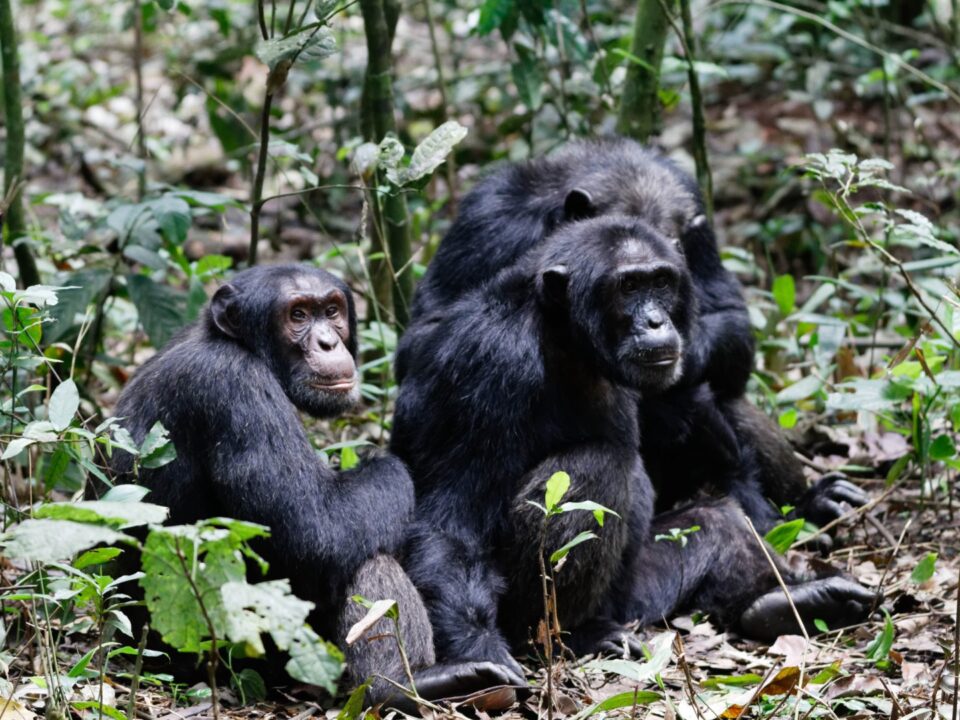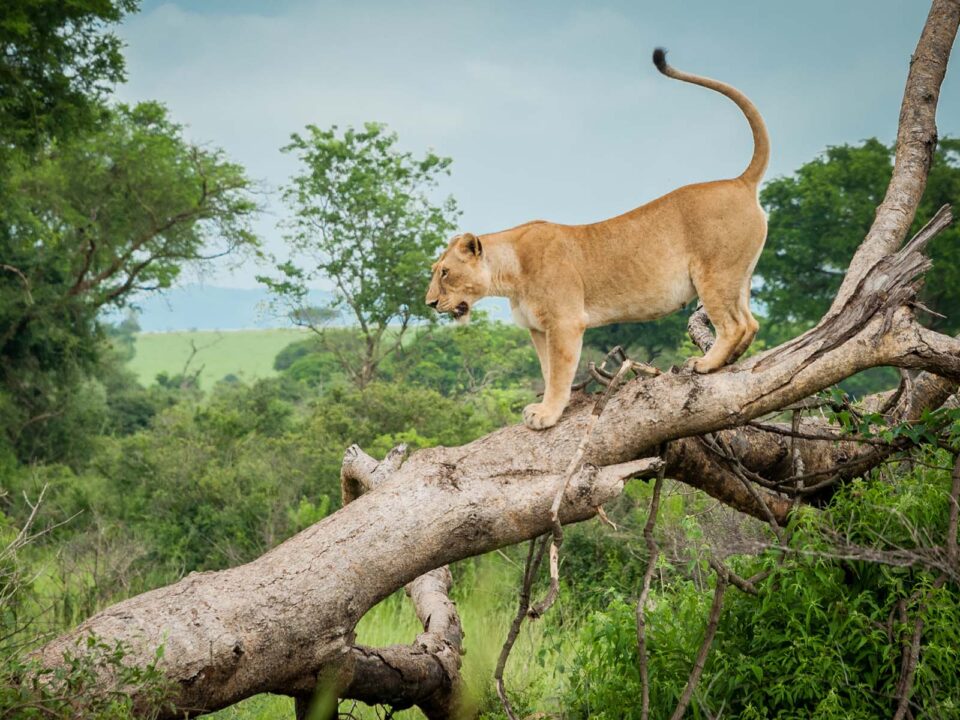Frequently Asked Questions About Chimpanzee Habituation Experience (FAQs)

What May Stop you from Seeing/ Trekking Mountain Gorillas in Uganda, Rwanda and Congo
January 2, 2023
Reasons to go Gorilla Trekking in Rushaga Sector
January 2, 2023Frequently Asked Questions about Chimpanzee Habituation Experience in Kibale Forest National Park
The process of habituating chimpanzees to the presence of humans is known as the chimpanzee habituation experience. It involves following a community of chimpanzees in their natural habitat and observing their behavior and activities without disturbing them. The goal is to familiarize the chimpanzees with the presence of humans without disrupting their natural way of life.
Habituation sessions typically begin early in the morning around 5:30-6:30am and continue until the chimpanzees nest for the night in the evening. They are typically conducted during the shoulder seasons of March to May and November, when there are fewer tourists in the park.
Kibale Forest National Park in Uganda is home to the largest number of habituated chimpanzees in Africa. Chimpanzees have a DNA similarity of about 98% with humans, so it is important to be cautious when interacting with them. They have a network of spies to alert them to any intruders in their territory, and will beat on tree trunks to signal to others if they sense anything suspicious.
Where Is Kibale Forest National Park Located?
Kibale Forest National Park is located in western Uganda and is home to a diverse range of vegetation and over 13 different primate species, including chimpanzees. The park shares a border with Queen Elizabeth National Park, and visitors may also have the opportunity to see a variety of wildlife such as forest elephants, giant forest hogs, duikers, warthogs, waterbucks, and bushbucks. Kibale Forest National Park is situated in the districts of Kibale, Kabalore, and Fort Portal City.
How to book chimpanzee habituation permits in Kibale National Park
The Uganda Wildlife Authority is responsible for issuing chimpanzee habituation permits. These permits can be difficult to obtain due to high demand, but Trek Africa Expeditions can help clients secure them.
There is a limited number of permits issued in order to protect the forest and maintain a balance between human presence and conservation. Overcrowding can lead to vegetation damage, which affects the chimpanzees‘ food supply, and can also hinder the habituation process by overwhelming the chimpanzees with too many people at once.
What Is the cost of a chimpanzee habituation permit in Kibale National Park?
The current cost for a chimpanzee habituation permit in Kibale National Park is $250 for foreign non-residents, $200 for foreign residents, and 150000 shs for East African Residents. If you would like to secure a permit through Trek Africa Expeditions, please provide us with your travel dates and the number of people in your group.
Which accommodation to book for chimpanzee habituation in Kibale National Park?
There are several options for accommodation at Kibale Forest National Park, including luxury, moderate, and budget options. The location of the accommodation can be within the park, near the park, or in Fort Portal City. Some specific accommodations to consider include Kyaninga Lodge, Primates Lodge, Ndali Lodge, Kibale Safari Lodge, Chimps Nest, and Mountains of the Moon Hotel. The choice of where to stay will depend on your budget.
How to do chimpanzee habituation In Kibale National Park
Before embarking on your chimpanzee habituation experience at Kibale National Park, it is important to first attend a briefing at the Kanyanchu Visitor Center with the ranger guide and other researchers. During this briefing, you will be given guidelines on how to responsibly observe the chimpanzees, including maintaining a distance of at least 8 meters from them and not feeding them. In addition to chimpanzees, you may also have the opportunity to observe other primates such as L’Hoest’ monkeys, black and white colobus, vervet monkeys, red tailed monkeys, blue monkeys, and bushbabies. The forest is also home to a variety of birds, including some Albertine endemics. When you encounter the chimpanzees, pay attention to their feeding behavior and social interactions, and feel free to take photos as a memento of your experience. Remember to follow the guidelines provided by the rangers to ensure a respectful and enjoyable visit.
How long is chimpanzee habituation experience in Kibale Forest National Park?
Finding the chimpanzees, particularly those who are still in the process of habituation, can be a bit of a challenge as they are mobile and may move around frequently. It may take anywhere from 2 to 4 hours to locate them, depending on the conditions of the forest. It is important to be patient during this process.
How many people are allowed to do chimpanzee habituation experience in Kibale forest National Park?
To ensure that the chimpanzees are not overwhelmed by human presence, only 4 tourists are allowed to participate in chimpanzee habituation experience with researchers at a time.
How difficult is chimpanzee habituation experience in Kibale National Park?
Kibale Forest National Park is located in a fairly flat area, with its highest point reaching an altitude of 1590 meters above sea level at the north end of the park. The park experiences two rainy seasons per year, from March to May and September to November. During these times, the forest may be wet, but the trails are still passable. The average annual rainfall in the area is about 1700mm, and the average temperature ranges from 14 to 27 degrees Celsius. When engaging in chimpanzee habituation in Kibale Forest National Park during the rainy seasons, it is recommended to bring a pair of binoculars as the chimpanzees may be feeding in the branches of trees rather than on the wet ground.
What is the age limit for chimpanzee habituation experience in Kibale Forest National Park?
Only individuals aged 12 and above are permitted to participate in chimpanzee habituation in Kibale National Park. This is because the activity may involve long or short walks through rough terrain, and requires a certain level of physical fitness. Additionally, the chimpanzees may display behaviors that could be intimidating or scary for younger children. It is also important to have patience when searching for the chimpanzees in the forest.
What are some fun activities for children in Kibale Forest National Park?
For children below the age of 12, there are many activities in Kibale National Park that are suitable for their delicate age and interests. These may include short walks to learn about the ecosystem and its inhabitants, participating in games like cyanotype and photography, and pond dipping. While the parents are engaged in chimpanzee habituation, the children can be left in the care of a professional children’s ranger for an educational experience that may last 1-2 hours.
How to get to Kibale National Park
There are two ways to get to Kibale Forest National Park from Kampala city or Entebbe Airport for chimpanzee habituation: by road or by air.
By Road:
- The northern route involves driving 300 km on tarmac roads from Kampala to Mubende to Fort Portal City, and then continuing on a murram road to Sebitori Forest Camp.
- The southern route involves driving from Kampala to Mbarara to Kamwenge, and then heading to Kanyanchu.
By Air:
- Scheduled domestic flights depart daily from Entebbe Airport and Kajjansi Airstrip to Kasese airport. From there, you will need to hire a transfer vehicle to take you to Kibale National Park.
- Charter flights can also be arranged upon request, but it is important to book in advance for your chimpanzee habituation trip.
Are there discounted chimpanzee habituation permits for Kibale National Park?
There are no discounts available on chimpanzee habituation permits for Kibale Forest National Park.
What do chimpanzees feed on?
Chimpanzees are typically vegetarian, but they may turn to eating monkeys during times of drought. They also include ants in their diet to provide additional nutrients.
What to pack for chimpanzee habituation experience in Kibale National Park
- Binoculars for clearer viewing of the chimpanzees
- Flash-less camera for taking photos as instructed by researchers
- Long-sleeved shirt and trousers in wilderness-friendly colors (e.g. khaki) to protect your skin from the forest conditions
- Insect repellent to keep stinging insects at bay
- Cap or large brim hat to protect your hair from dripping water
- Extra fully charged camera battery
- Torch for use at night when the lights go out at your lodge
- Toiletries in case your lodge does not provide them
- Notebook or journal and pen to record the chimpanzees’ activities with researchers
- Water bottle for drinking water in the forest
- Cash for domestic transactions (credit cards may not be widely accepted in the countryside)
What are the chimpanzee habituation experience rules in Kibale National Park
- Do not litter the forest with any waste, as this can alter the natural environment and impact the chimpanzees’ food supply
- Do not eat in front of the chimpanzees, as this may encourage them to try to take food from you
- If you need to defecate, ask your ranger guide to dig a hole at least 30 meters deep and cover it well to maintain proper forest hygiene and prevent the chimpanzees from becoming curious
- Do not provoke the chimpanzees, as they can become aggressive
- Children under 12 years old are not allowed to participate in chimpanzee habituation experience
- Keep a distance of at least 8 meters from the chimpanzees for clearer observation and to reduce the risk of transmitting infections
- Do not enter the forest for habituation without a ranger guide, as they are more familiar with the area and the behavior of the chimpanzees”




